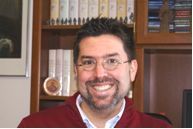Yep, back in December I decided I wanted to see if I had the willpower to fast from soft drinks for an entire year. The doctor didn't give me orders, I wasn't making some environmental statement, just a private little game I wanted to play and see if I could do it. Monday evening, 212 days into my self-proclaimed fast, I broke down.
And you know what? It tasted really, really good.
Throughout the fast I wish I could say I found myself thinking more about Christ than Coke. I wish I could say I came to relish water and felt waves of the Spirit wash over me. But I didn't. I missed soda. Was something wrong with my fast?
Nope. I think something was wrong with what I expected. There were ample times these past eight months when I could have had a Pepsi, a 7-UP, or (the most tempting of all) a Diet Mt. Dew (hi, my name is Bruce, and I'm a Dewaholic). But I didn't. I set them aside or just selected something else. It wasn't always easy, but I learned that I could set aside my first inclination and choose a different beverage.
As a pastor I often find myself the recipient of praise and acknowledgement that I frankly don't deserve. Other people have done the hard work and, as lead pastor, I get the credit. There's a flip side, too, of course. I just as often (although it feels like WAY, WAY more often) find myself the recipient of ridicule and blame that I similarly don't deserve. Other people dropped the ball, there was miscommunication (usually the culprit), whatever the case, as lead pastor I get the arrows shot my way.
And my first inclination is to straighten out the problem. To make sure people know what really happened, to the degree that I can explain without betraying confidences and the like. To help people understand that it isn't as bad, I'm not as bad as they think.
I think this is the purpose of fasting. To help me see that I don't have to go with my first inclination. To not always be quick with a ready response. To not defend, explain, justify, or in any way talk over the other's thoughts but just to let them be. It's okay. And I'll be okay, too.
So I've stopped drinking soft drinks again. Here's to stopping the inclination to put myself in a better light, too.
Back on the wagon we go.


